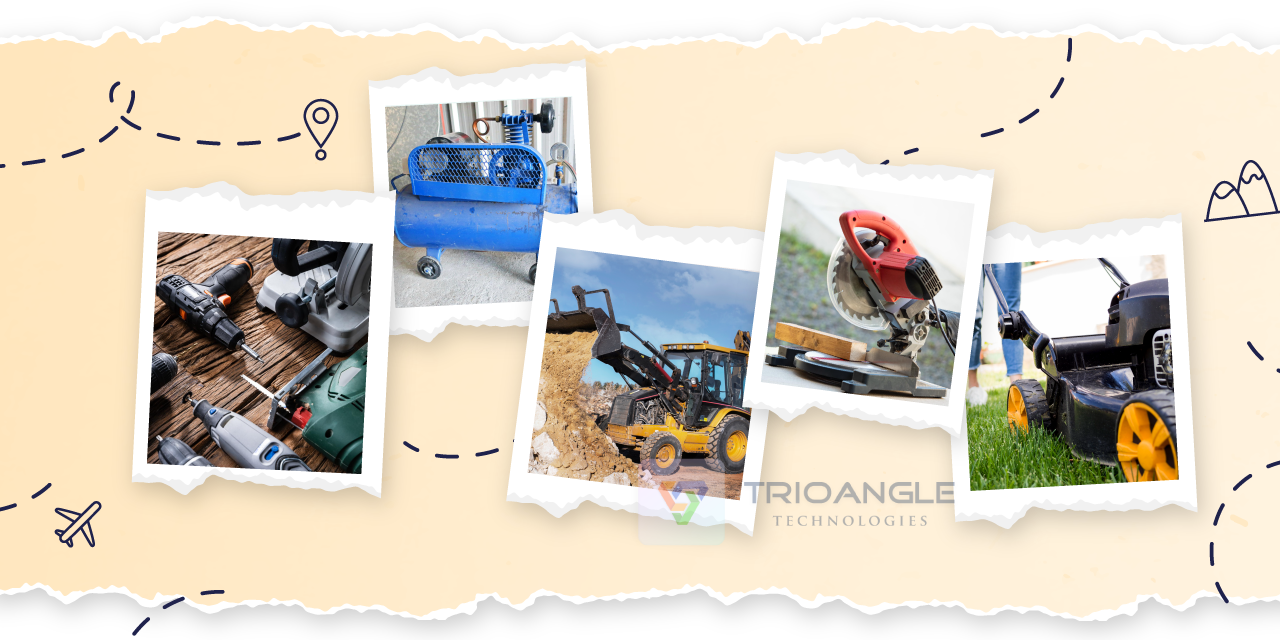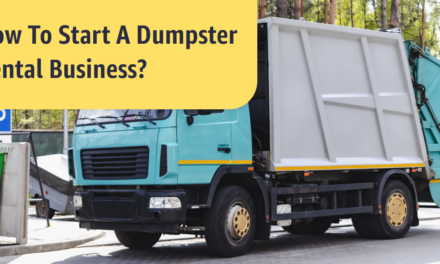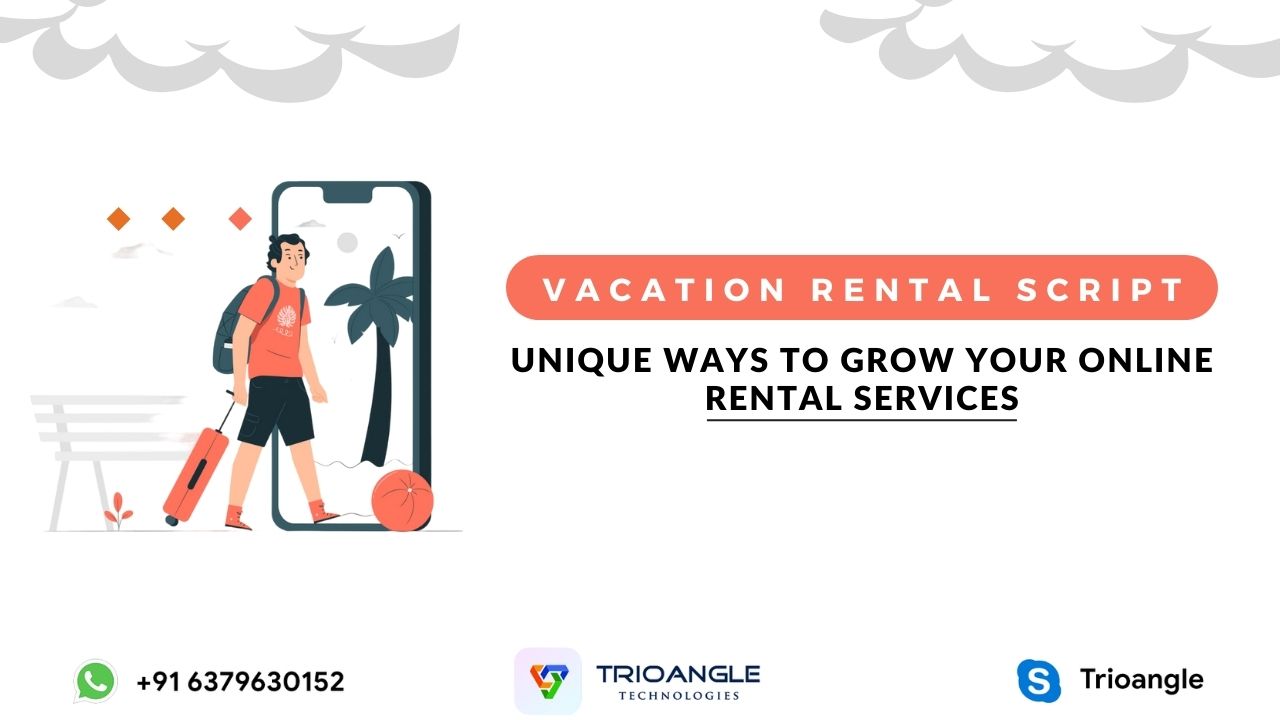Launching an equipment rental business, gear up for success today!
Did you know?
The global equipment rental market is expected to reach $118 billion by 2029, up from $42.64 billion in 2022.
As urban living continues to expand, the demand for rental equipment has also surged over the past 2-3 decades. This constant growth presents a ripe investment opportunity.
Starting an equipment rental business can provide a solid source of passive income, and most importantly, your investments will always be safe. You can start as a one-person entrepreneur, and later, you can expand into a small-sized company.
If you’re looking to start your own online rental business on equipment, but not sure about where to begin? Don’t stress.
This guide covers everything about starting a successful equipment rental business. Position yourself up for success with this comprehensive guide.
Let’s get started!
What Is “Equipment Rental Business”?
An equipment rental business operates within the service industry, offering machinery, tools, and equipment of various types, shapes, and sizes for rent. Customers can rent the equipment for a predetermined period before returning it to the business.
The rental business acquires the equipment and rents it to customers for a fixed fee, typically charged on a per-day, per-week, or per-month basis. The rental fee is set to cover the initial cost of the equipment and generate a profit over time.
A wide range of equipment can be rented out, catering to diverse customers and industries. You may choose to specialize in specific types of equipment, target particular industries, or offer a broad selection of options to cater to various needs.
Now that you’ve understood the concept of the equipment rental business, let’s delve into the steps to start a rental business on equipment.
Steps to Start an Equipment Rental Business
Like any other business, starting a rental business on equipment isn’t an easy process, but it’s not too complicated. With the right planning and strategies, you can step into the industry and start generating profits efficiently.
Are you looking to launch an equipment rental business? Here’s a detailed guide to help you get started:
1. Understand the Equipment Rental Market
Before diving into the equipment rental business, it’s crucial to conduct thorough market research to understand your potential customers’ needs and preferences. By gaining insights into the market, you can identify opportunities, predict demand, and tailor your offerings to meet customer expectations effectively.
The most effective method for doing this is to directly engage with potential customers. For example, if you’re looking to rent out machinery, initiate conversations with local construction companies to understand their specific needs and preferences. Here are some questions you can ask:
- What kind of equipment are you in demand of? Are you looking for high-end or basic machinery?
- Which brands or specific products do you prefer or have experience with?
- What budget range are you comfortable with for equipment rentals?
- Are there any additional services or offerings you would like from a rental provider to streamline your operations?
This firsthand knowledge will provide valuable insights into market demand and lay a strong foundation for your rental business on equipment.
2. Research Your Equipment Rental Competition
The next step in launching your rental business on equipment is to conduct thorough market research to gain valuable insights into your local competition. Here’s how you can set up for equipment rental venture:
Conduct In-Dept Competitor Analysis
Start by identifying your competitors locally, within your region, and across your state. Understand their offerings, pricing strategies, and customer retention methods. The broader your research scope, the better understanding you’ll have of the competitive landscape.
Analyze Pricing Strategies
Evaluate the average pricing for the equipment you plan to rent out, considering factors such as availability, seasonal demand fluctuations, and weather conditions. Adjust your pricing strategy accordingly to remain competitive while ensuring profitability. Keep in mind that specialized equipment may have varying rental rates based on utilization patterns.
Determine Your Unique Selling Proposition (USP)
Differentiate your business by identifying a compelling unique selling point (USP) that sets you apart from the competitors. This could include offering services such as extended operating hours, on-the-spot maintenance, or specialized equipment not readily available elsewhere.
Your USP should address key challenges faced by your target customer base, providing them with added value and incentivizing them to choose your rental business.
3. Decide Your Equipment Rental Business Kind
Various types of equipment can be rented out that cater to a wide range of customers and industries. You may choose to specialize in a particular type of equipment or industry or offer a wide range of options.
Here, four types of rental business models are explained, let’s understand and fix them based on your requirements.
Party Equipment Rental Business
A party equipment rental business caters to individuals or organizations hosting events such as weddings, parties, or corporate gatherings. These customers often prefer to rent equipment rather than purchase it due to the high cost and the one-off nature of the event. Equipment commonly rented out includes dance floors, chairs, tables, sound systems, decorations, and staging.
Construction Machines and Equipment Rental Business
Construction machines and equipment are rented primarily to construction firms, contractors, and people involved in the construction industry. This includes a variety of equipment such as excavators, earth-moving machinery, forklifts, working platforms, and construction lifts. Among all, the construction equipment rental business is the most popular and lucrative option.
Baby Equipment Rental Business
This kind of rental is a “non-traditional” yet potentially profitable business idea. Baby gear such as strollers and car seats can be cumbersome to transport, especially in airports and other public places. Renting baby equipment provides a convenient solution for travelers, making it a sought-after service.
Sports Equipment Rental Business
Renting sports equipment offers a versatile business opportunity. You can provide various sports equipment like golfing, scuba diving, and boating equipment.
Additionally, you can also rent out sports equipment to schools, colleges, and organized events. Depending on your location, you can offer daily rentals for items such as snorkeling equipment, paddle boards, and fishing gear, especially if you are situated near the coast.
4. Create a Winning Business Plan
The next step in starting your rental equipment business is to plan it in detail. To ensure the future success of your business, detailed planning is crucial. This involves creating a comprehensive roadmap that considers all factors affecting your operations.
Here’s how to detail your rental business plan:
Detail the Business Plan
Create a comprehensive business plan that outlines all operational workflows, including equipment usage, daily operations, monthly reporting, and long-term projections. Consider every aspect of your business, from procurement to customer service.
Define Business Goals
Identify your target market and establish clear business goals tailored to the needs. For example, if you’re targeting construction companies, determine how your rental business will add value to their operations. Furthermore, it highlights the benefits of renting equipment from your business over purchasing their own.
Creating a detailed and future-proof business plan will set a solid for your rental equipment business and increase its chances of success.
5. Set a Budget for Your Equipment Rental Business
After finalizing your business plan, it’s time to set a budget for your rental equipment business. This budget will help you predict all financial aspects, including startup costs, equipment expenses, permits, insurance, marketing, and operational expenses.
Here are some tips for creating a solid financial plan:
Calculate All Initial Business Costs
Predict and document every expense from the start of your rental business to its operational phase. Include all potential costs to ensure comprehensive financial planning.
Identify Operational Costs
Be aware of all expenses associated with running your rental business on equipment, such as maintenance, repairs, staffing, and overheads. Consider the costs of rental software and marketing efforts as well.
Set Revenue Targets
Determine rental prices for your equipment and set revenue targets for each quarter. Align your marketing and rental strategies with these targets to ensure financial stability and growth.
There are multiple money-making methods in the rental business. Carefully implement the right strategy to make substantial revenue and increase your ROI.
Review Quarterly and Align
Treat the first year of your rental business as a trial period and regularly review your performance. Highlight successful strategies, areas for improvement, and any equipment with low utilization. Adjust your business strategies accordingly to maximize revenue.
6. Invest in the Right Equipment
Now that you understand your market and the equipment your potential customers need, it’s time to build your inventory. Depending on your budget, you can choose between new or used equipment.
If you have sufficient capital, consider purchasing all necessary equipment at the start of your business. Alternatively, you can prioritize high-utilization equipment initially and acquire low-utilization equipment later. Leasing is also a viable option to minimize startup costs and avoid heavy upfront investment.
Rather than purchasing all equipment at once, gradually add to your inventory based on demand. This approach allows you to manage costs effectively while ensuring you meet customer needs.
7. Create a Website/App for Your Equipment Rental Business
After acquiring the necessary equipment for your business, it’s essential to establish an online presence to attract potential customers. One effective way to achieve this is by building a professional website for your rental equipment business.
As per a survey by Clutch.com, 36% of small businesses don’t have websites despite the significant number of consumers who rely on online searches to find businesses.
Build a Professional Website
Consider developing a website to manage your rentals online and streamline your operations. Creating a website for your rental services allows you to set up a professional online portal quickly.
Develop a User-Friendly Mobile App
In addition to a website, consider developing a mobile app for your rental business. There are two approaches to mobile app development: building an app from scratch or using a rental script. Building an app from scratch may require more time and expense.
Another option is to utilize a rental script, a pre-built software solution equipped with all core features and functionalities, that allow you to launch your rental mobile app quickly and cost-effectively.
There are numerous rental scripts available on the market, choose one that aligns perfectly with your business needs and requirements.
Having a website or mobile app for your rental equipment business offers numerous benefits, such as enabling customers to check availability and rent equipment instantly. This eliminates the need for time-consuming manual booking processes via phone calls and enhances overall efficiency.
8. Invest in Marketing for Your Equipment Rental Business
Crafting a robust marketing and promotion strategy is important for generating awareness and attracting customers to your rental business.
Focus on the following points:
Online Marketing Channels
Utilize various online platforms such as social media platforms and search engine optimization (SEO) techniques to effectively reach your target audience and increase visibility for your equipment rental services.
Local Partnerships
Collaborate with local construction firms, event organizers, and businesses to mutually promote each other’s services. Partnering with local businesses helps expand your reach and attract potential customers to your services.
Promotional Deals and Programs
Implement enticing promotional deals, referral programs, and loyalty rewards to incentivize customers to choose your equipment rental service over competitors. Offering discounts for bulk rentals or long-term contracts can also attract business clients.
Engaging Content
Engage with your audience by creating informative and engaging content that showcases the benefits and versatility of your equipment rental offerings. Utilize blog posts, videos, and social media posts to build a strong brand presence and establish trust with potential customers.
Regularly review and update your marketing strategies to stay competitive in the fierce equipment rental industry.
9. Provide Excellent Customer Service
Providing exceptional customer service is essential for success in the rental business and plays a crucial role in business growth. Here’s how you can ensure your service stands out:
Responsive Communication
Always prioritize responsiveness to your customer inquiries. Offer clear and concise communication, guiding them through the rental process and helping them choose the right equipment for their specific needs.
Empathetic Support
Respond promptly to customer inquiries, address concerns empathetically, and resolve any issues that may arise during the rental process. This demonstrates your commitment to customer satisfaction.
Feedback Integration
Encourage customers to share their feedback about their rental experience. Use this valuable input to continually improve your services, ensuring they meet and exceed customer expectations.
Happy customers are the backbone of your business. By providing exceptional customer service, you can cultivate repeat clients and benefit from positive word-of-mouth referrals, which are invaluable for business growth.
Bring Everything Together
I hope this guide will serve as a valuable roadmap to launch a rental business on equipment. It’s an exciting venture, particularly for those with experience in the industrial sector who feel ready to take their career to the next level by starting their own business.
Whether you’re a seasoned entrepreneur or starting your first business venture, there are key steps you can take to ensure success in the equipment rental industry.
By following the steps outlined above in this blog and staying focused on your goals, you can build a successful rental equipment business that caters to the needs of your customers and paves the way for financial stability.
Let’s embark on this entrepreneurial journey in the equipment rental sector with enthusiasm, knowing that your efforts have the potential to yield significant returns on investment!




